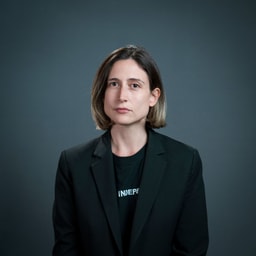Ukraine Business Roundup — Issue 1

The following is the first edition of our new Ukraine Business Roundup weekly newsletter. To get the biggest news in business and tech from Ukraine directly in your inbox, subscribe here.
International meeting in Kyiv
Last Friday and Saturday, Ukrainian and foreign political and business leaders, including President Volodymyr Zelensky, got together in the basement of Kyiv’s Intercontinental Hotel for the Yalta European Strategy (YES) Conference. The title of this year’s conference: “The Future is Being Decided in Ukraine.”
The choice of the hotel’s basement, while likely for security reasons, created a war-time bunker vibe. The center wall was covered with TV screens playing reels of drone footage of the battlefield overlaid with the words “YES War Room.” Side panel screens had Twitter posts of war updates from Ukrainian media.
The message Ukraine’s officials wanted to convey? Ukraine’s economy is surviving, the country is open for business, and the government is fighting corruption despite the difficulties brought on by war.
Deputy Economic Development and Trade Minister Yuliia Svyrydenko said that despite a loss of 29.6% in GDP last year, the Economy Ministry expects the country’s GDP growth in 2023 to be close to 4%. Ukraine’s central bank is less optimistic, predicting that growth to look more like 2.9%. The World Bank is even less upbeat, however, estimating GDP growth of 0.5% in 2023.
Prime Minister Denys Shmyhal was similarly confident Ukraine is on the right track. “This year, Ukraine’s economy has kept going, and reconstruction has started,” he said. Shmyhal cited estimates that put the destruction caused by Russia’s war at around $400 billion, saying that while this is a tragedy for Ukraine, it is also an opportunity to “build back better.”
According to Shmyhal, Ukraine has received over $30 billion from international partners over 8.5 months this year. When pushed by the moderator, BBC host Stephen Sackur, on whether Ukraine is too dependent on outside financial assistance, Shmyhal responded by saying that the country is using “100% of taxes collected by the state to fund the military.” That revenue has already amount to Hr 1.8 trillion ($48 billion), which is is higher than in peace time, Shmyhal said.
That’s all very well, but Ukraine will still need to make up for huge shortfalls in the budget and is looking to get between $12 billion and $14 billion in financial assistance from the U.S. next year, and $3.3 billion before year’s end, Finance Minister Serhiy Marchenko told reporters in Kyiv, Bloomberg reports.
And with elections looming in the U.S., the question on everyone’s mind is if the support will keep flowing.

Minus 1 oligarch?
While Ukrainian oligarch Victor Pinchuk, whose foundation sponsors YES, was applauding proudly in the front row at the conference, another Ukrainian oligarch was sitting behind bars in a Kyiv jail cell.
That oligarch is none other than the infamous Ihor Kolomoisky, now facing charges of fraud and money laundering. Ukraine’s Security Services suspect Kolomoisky of laundering Hr 500 million ($13.5 million) in 2013-2020. The National Anti-Corruption Bureau of Ukraine (NABU) has charged him with embezzling Hr 9.2 billion ($250 million) from PrivatBank, Ukraine’s largest bank once owned by Kolomoisky before it was nationalized in 2016. Ukraine also froze the oligarch’s shares in over 300 companies.
Our reporter Igor Kossov wrote a story on Kolomoisky’s history and one bit in there really stuck out. At the height of his career, the oligarch “controlled PrivatBank, Ukrtatnafta oil company, DniproAzot, a major chemical company, Nikopol Ferroalloy Plant, Ukraine International Airlines, the country's biggest, 1+1 Media Group, which operated eight TV channels, and a number of other plants, factories and other businesses,” Kossov writes.
He also “owned 10 popular sports clubs, and effectively controlled Centrenergo, a major energy company, and Ukrnafta, the country's largest oil producer, despite controlling a minority state in those companies.” At one point in his career, he was also the governor of Dnipropetrovsk Oblast.
That’s quite the empire. Unsurprisingly, with that kind of portfolio he is also known to have close ties with a slew of Ukrainian lawmakers and government officials. President Zelensky was once believed to be Kolomoisky’s guy, given Zelensky’s rise can be partially attributed to his successful television shows that aired on Kolomoisky’s channel. But just recently, Zelensky thanked law enforcement following the oligarch’s arrest.
The titan’s apparent fall from grace raises one major question – does Kolomoisky’s arrest signal the beginning of the end for the oligarchy in Ukraine?
Tetiana Shevchuk, a lawyer with the Anti-Corruption Action Center, wrote to the Kyiv Independent in a written comment for this newsletter that Kolomoisky’s arrest by Ukraine’s security services is a “signal to oligarchs that the old oligarchy as it was is over, and (oligarchs) now have to play along with the government.”
“This does not mean, however, that at some point Ukraine won’t get ‘new oligarchs,’” she said. But if the cases brought against Kolomoisky are successful, it will bring real change to the political system, according to Shevchuk.

Legalize nudes
It may come as a surprise that consensual pornography is still illegal in Ukraine. And it’s not just one of those archaic laws that never got changed. Ukrainian law enforcement consistently charge citizens for things like sending nude photographs. In 2023 already, almost 700 criminal cases related to pornography were opened, not including cases related to child pornography.
Some members of Ukraine’s parliament say this has to stop. In their view, “the decades-old prohibition of pornography harms ordinary citizens by going after them for consensual sexual content, wasting state resources in the process,” Kyiv Independent reporter Alexander Query writes.
The law also makes no economic sense, experts say, given that OnlyFans, one of the world’s largest online platforms for erotic content, has already generated nearly $1 million to Ukraine’s state budget this year.
“It's stupid to collect taxes for that and say it's criminal at the same time,” Ukrainian lawmaker Yaroslav Zhelezniak told the Kyiv Independent.
It may also seem strange that lawmakers are focused on pornography during an all-out war with an enemy such as Russia. But to the people who want to change the law, it is a question of both protecting the rights of ordinary citizens and an opportunity to generate more tax revenue for the state.
According to Ihor Samokhodskyi, head of the IT bureau at Better Regulation Delivery Office, legalizing pornography has the potential to “bring billions of hryvnias in taxes over the span of several years.”

Those who may never return
In more somber news, a recent study estimated that the number of Ukrainians who may never return to their home country after fleeing Russia’s war could be from 1.3 million to as high as 3.3 million Ukrainians — around 8% of the population.
The estimate is 600,000 higher than last December, the Center for Economic Strategy, a Kyiv-based think tank, said in its recent report. The reason for the jump is related to the lasting duration of the conflict, now in its 18th month, Russian attacks on Ukraine’s energy infrastructure, and increasing adaptation to life abroad.
“The non-return of Ukrainians will significantly impact the Ukrainian economy, which could lose between 2.7% and 6.9% of GDP annually,” the report said.
A survey by the Info Sapiens group commissioned by the CES found that the majority of Ukrainians (63%) currently living abroad plan to return to Ukraine. “However, it is unclear whether all of them will actually return,” the CES wrote.
How can Ukraine bring them back? Along with several policy recommendations, the think tank points out that reconstruction is key.
“People who have fled from the war zone may not have a place to return to, so their return will depend on how quickly their regions are rebuilt or whether they receive support to relocate to the other regions of Ukraine.”

Upcoming grain ban decision
An EU ban on Ukrainian grain imports to its eastern European neighbors is set to expire this Friday, Sept. 15. Poland, Hungary, and Slovakia are demanding the EU extend the ban until the end of the year.
Just today, the Polish government announced it was planning on appealing to the European Commission to extend the ban, saying that even if the EU doesn’t prolong the measure, Warsaw will introduce restrictions at the national level.
According to Ukraine’s neighbors, the influx of grain from Ukraine as it looked for alternative routes to export its agricultural products in the face of Russia’s Black Sea blockade threatened their domestic farmers and caused logistical bottlenecks. These countries say that lifting the ban will exacerbate these disruptions.
Kyiv appealed to the EU not to prolong the ban, saying it would be "unacceptable" to continue the restriction past Sept. 15.
We’ll be keeping an eye out for what happens Friday and what the ensuing political standoff means for Ukraine’s grain exports.
What else is happening
The U.S. will be the first country to transfer confiscated Russian assets to Ukraine. U.S. Secretary of State Antony Blinken said during his visit to Kyiv last week that Washington is planning to transfer $5.4 million in “assets seized from sanctioned Russian oligarchs” to support Ukrainian military veterans. The Wall Street Journal also reported that according to bond analysts at Goldman Sachs, $150 billion in frozen Russian assets could also go to Ukraine to help the country.
Ukraine regained control of a set of oil drilling platforms located in the Black Sea, Ukraine's Military Intelligence (HUR) announced on Sept. 11. The drilling platforms are known in Ukraine as the “Boyko Towers” from controversial politician Yuriy Boyko, who was involved in the purchase of the rigs in 2011 as Energy Minister under pro-Russian president Viktor Yanukovych. Ukrainian journalists found at the time that the tender process for their purchase was corrupt and siphoned millions of dollars from the state budget.
Ukraine’s Ministry of Digital Transformation announced that foreigners will have the right to register as individual entrepreneurs in Ukraine, open bank accounts, and run their businesses online. Allowing foreigners to become “e-residents,” as the government calls it, “opens the door for additional foreign investment and provides a mechanism for doing business in Ukraine without bureaucratic barriers," Deputy Minister of Digital Transformation Oleksandr Borniakov said. E-residents won’t be able to provide services to Ukrainian citizens, however, and will only be able to work with other foreigners.










